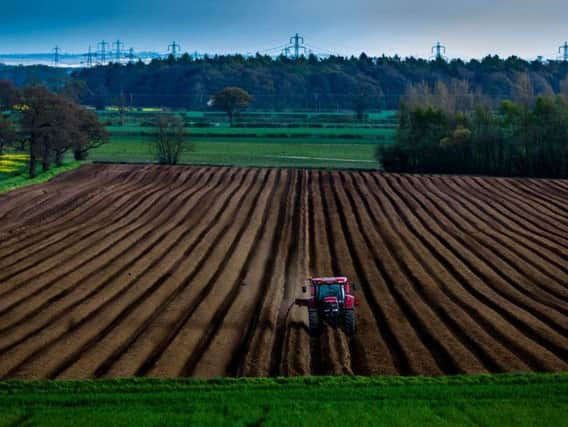Climate change already hitting British crops - coalition warns


Climate change is causing severe heatwaves and flooding more often than before and if the trend continues, British-grown potatoes and other fruit and veg will be harder to come by for shoppers without sustained action from the Government and the food industry, The Climate Coalition warned.
The group’s research found that more than half of UK farms had been affected by a severe climatic event in the past decade.
Advertisement
Hide AdAdvertisement
Hide AdBritish potato crops are identified as among the crops that are most at risk from climate change, with last summer’s prolonged drought conditions highlighted as evidence.
Potato yields fell by a fifth across England and Wales last year and if climate projections prove accurate, the UK is expected to lose almost three-quarters of land currently well suited for their production by the 2050s.
Other crops were badly affected by last summer’s dry and hot conditions too. Yields of carrots were down by up to 30 per cent and onions by 40 per cent.
A year earlier and late spring frosts left some English vineyards reporting damage to up to 75 per cent of their crop.
Advertisement
Hide AdAdvertisement
Hide AdLee Abbey, head of horticulture at the National Farmers’ Union (NFU), said: “A lot of growers will have come out of this year with sore heads and not much income.
“Farmers and growers are used to dealing with fluctuations in the weather but if we have two or three extreme years in a row it has the potential to put growers out of business.”
Last year’s weather patterns and their effects on potatoes meant the average British chip was more than an inch smaller.
The Yorkshire Post says: A co-ordinated approach is needed to tackle threat of climate changeClara Goldsmith, director of The Climate Coalition, said: “Losing an inch off our chips is no laughing matter. Even worse if we lose supplies of our much-loved British spuds altogether. We should be doing all we can to help safeguard our homegrown fruit and vegetables for future generations.”
Advertisement
Hide AdAdvertisement
Hide AdThe Climate Coalition is made up of more than 130 organisations, ranging from WWF, The Women’s Institute, RSPB and National Trust, to aid agencies such as Christian Aid and CAFOD.
Its new 'Recipe for Disaster' report draws on research by the Priestley International Centre for Climate at the University of Leeds and includes a foreword by TV chef Hugh Fearnley-Whittingstall.
The chef writes: “We have to do all we can to limit climate change.
“If you shop locally and eat seasonally you are already doing your bit.
Advertisement
Hide AdAdvertisement
Hide Ad“But climate change has to be tackled at the very top. If we are to protect our fantastic British fruit and veg for future generations, then the food industry and our Government have got to step up and make the kind of major changes - reducing emissions, cutting waste, supporting green energy, for example - that will have a profound effect.”
Environment Secretary Michael Gove backed The Climate Coalition’s report and said high-quality, locally-grown fruit and veg, and the livelihoods of the hard-working farmers who grow it, are increasingly threatened by more extreme weather.
He reiterated that farmers will be rewarded for limiting climate changing emissions under the UK’s first domestic agricultural policy for more than 40 years.
“We will use powers in the Agriculture Bill to reward farmers who reduce their emissions and adapt to the effects of climate change through our new Environmental Land Management scheme,” Mr Gove said.
Advertisement
Hide AdAdvertisement
Hide AdThe NFU recently announced its aspiration for UK farming to become net zero in its greenhouse gases by 2040.